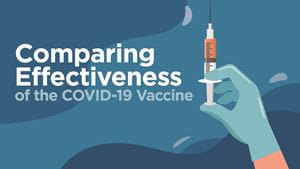
In clinical trials of more than 40,000 participants, the Pfizer/BioNTech COVID-19 vaccine was 95% effective against COVID-19. In clinical trials of more than 30,000 participants, the Moderna vaccine was 94% effective against COVID-19. High efficacy rates of vaccines aren’t uncommon, with many common vaccines like measles, polio, tetanus, and hepatitis showing efficacy rates of above 80%. So, how does the effectiveness of the new COVID-19 vaccines compare to other common vaccines?
Dr. Maryrose Laguio-Vila, an infectious disease expert at Rochester Regional Health, provides insight into the effectiveness of some of today’s most common vaccines.
“The COVID-19 vaccines are comparatively highly-effective in preventing infection when you look at the other vaccines we regularly get or provide our children,” she explained.
Here are the efficacy rates of some of today's most common vaccines and how they compare to the 94%-95% effectiveness of the COVID-19 vaccines:
The Centers for Disease Control and Prevention (CDC) studies the flu vaccine’s effectiveness each year. While results can vary, recent studies show that the flu vaccination reduces the risk of flu illness by between 40% and 60% among the overall population during seasons when most circulating flu viruses are well-matched to the flu vaccine.
“Even though 40-60% might appear low, the flu vaccine is highly effective in reducing the spread of the flu and the severity of the infection, should you get it,” Dr. Laguio-Vila said.
Children in the United States get four doses of the polio vaccine, and each dose increases the vaccine’s effectiveness. The first dose is given at two months old, then four months, then between six and 18 months, and the fourth between four and six years old.
The CDC says that two doses of the polio vaccine are 90% effective at protecting against polio, and three doses are approximately 100% effective.
Protection against tetanus is provided with the DTaP vaccine which protects against diphtheria, tetanus, and pertussis. The DTaP vaccine is given to infants and provides protection for approximately 10 years. A booster vaccine called TDaP is given after 10 years and then every 10 years to maintain protection.
While similar in name, the DTaP and TDaP vaccines are not to be confused with each another. The DTaP vaccine is the initial vaccine given to children, and the TDaP vaccine is the booster vaccine given several years later and into adulthood to continue providing protection.
The CDC says that “nearly all cases of tetanus today are in people who never got a tetanus vaccine or did not receive a complete course of tetanus vaccines, or adults who didn’t stay up to date on their 10-year booster shots.”
The Measles, Mumps, and Rubella (MMR) vaccine is administered as one vaccine to children in two doses. The first dose is typically given at 12 to 15 months of age and the second dose at 4 to 6 years of age. After the second dose, the effectiveness of protection against measles increases to 97%, and the effectiveness for protection against mumps increases to 88%.
Hepatitis A and B are serious diseases caused by a virus that attacks the liver. Vaccines with high efficacy rates are given to children and all age groups for long-term protection and prevention.